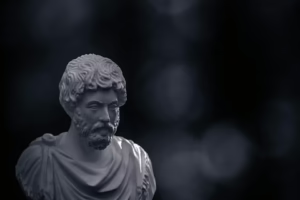The Big Questions: Exploring Life’s Mysteries Through Philosophy
Introduction: Navigating the Labyrinth of Existence
Humanity, from its earliest stirrings of consciousness, has grappled with fundamental questions that probe the very essence of existence. What is the meaning of life? Does God exist? What is the nature of reality? How should we live? These are not merely intellectual exercises confined to ivory towers; they are the profound inquiries that shape our values, guide our actions, and ultimately define who we are. These “Big Questions” are the cornerstone of philosophical inquiry, a field dedicated to the rigorous examination of fundamental concepts and beliefs.
Philosophy, derived from the Greek words “philo” (love) and “sophia” (wisdom), is literally the “love of wisdom.” It’s a systematic attempt to understand ourselves, the world around us, and our place within it. Unlike other disciplines that focus on specific areas of knowledge, philosophy aims for a holistic understanding, examining the interconnectedness of various aspects of human experience. It employs critical thinking, logical reasoning, and careful analysis to dissect complex problems and uncover hidden assumptions. [mfn 1]
This article aims to delve into these Big Questions, exploring the diverse perspectives offered by different philosophical schools of thought and highlighting the enduring relevance of philosophical inquiry in the 21st century. We will journey through millennia of philosophical thought, examining the contributions of seminal thinkers and grappling with the challenges they posed. While definitive answers may remain elusive, the process of philosophical exploration itself offers profound insights into the human condition and illuminates the path towards a more meaningful existence.
I. What is the Meaning of Life? The Quest for Purpose and Significance
Perhaps the most frequently asked and deeply felt of all the Big Questions is: What is the meaning of life? This seemingly simple question has plagued philosophers, theologians, and individuals alike for centuries, generating a vast array of responses, each reflecting a different understanding of human nature and the universe.
A. Theistic Perspectives: Finding Meaning in Divine Purpose
For many, the meaning of life is inextricably linked to the existence of a divine being or a transcendent reality. Theistic perspectives often posit that humans are created by God for a specific purpose, and that fulfilling this purpose is the key to a meaningful life. This purpose can take various forms, including:
- Serving God: Many religious traditions emphasize the importance of worshipping and obeying God’s commandments as the primary purpose of life. This involves living a life of piety, adhering to religious doctrines, and engaging in acts of service and charity. [mfn 2]
- Achieving Salvation: In some religions, particularly Christianity, the ultimate goal is to attain salvation and eternal life in the presence of God. This requires faith, repentance, and adherence to moral principles. [mfn 3]
- Fulfilling God’s Will: Some believe that each individual has a unique purpose assigned by God, and that discovering and fulfilling this will is essential for a meaningful life. This can involve pursuing a specific career, contributing to society, or nurturing relationships. [mfn 4]
Theistic perspectives offer a comforting framework for understanding the meaning of life, providing a sense of purpose, direction, and hope. However, they also raise questions about the nature of God, the problem of evil, and the validity of religious claims. Furthermore, they may not resonate with individuals who do not subscribe to a particular religious belief system.
B. Nihilism: The Denial of Meaning and Value
In stark contrast to theistic perspectives, nihilism asserts that life is inherently meaningless and without intrinsic value. Nihilists argue that there is no objective purpose, no ultimate truth, and no inherent morality. This can be a deeply unsettling perspective, leading to feelings of despair, alienation, and existential angst.
- Classical Nihilism: Promoted by thinkers like Friedrich Nietzsche (in some interpretations) and Max Stirner, classical nihilism rejects all traditional values and beliefs, including religion, morality, and social norms. They see these values as artificial constructs that serve to suppress individual freedom and creativity. [mfn 5]
- Existential Nihilism: This form of nihilism acknowledges the absurdity of existence, the lack of inherent meaning, and the inevitability of death. It emphasizes the burden of freedom and the responsibility of creating one’s own values in a meaningless world. [mfn 6]
While nihilism can be a challenging and even depressing philosophy, it can also be liberating. By rejecting all external sources of meaning, it compels individuals to confront the fundamental questions of existence and to forge their own unique paths.
C. Existentialism: Creating Meaning in an Absurd World
Existentialism, a prominent philosophical movement of the 20th century, grapples with the problem of meaninglessness in a world devoid of inherent purpose. Existentialists acknowledge the absurdity of existence but reject the nihilistic conclusion that life is therefore meaningless. Instead, they argue that meaning is not something to be discovered but something to be created.
- Emphasis on Freedom and Responsibility: Existentialists like Jean-Paul Sartre and Simone de Beauvoir emphasize the radical freedom of individuals to choose their own values and define their own essence. This freedom comes with a profound responsibility for one’s actions and choices. [mfn 7]
- Authenticity and Self-Creation: Existentialists urge individuals to live authentically, embracing their freedom and taking responsibility for their choices. This involves rejecting societal pressures and expectations and creating a life that is true to oneself. [mfn 8]
- The Anguish of Choice: The freedom to choose one’s own values can be a source of anguish, as individuals are confronted with the uncertainty and potential consequences of their decisions. However, existentialists argue that this anguish is a necessary part of the process of self-creation. [mfn 9]
Existentialism offers a powerful framework for finding meaning in a meaningless world, empowering individuals to take control of their lives and create their own values. However, it can also be criticized for its emphasis on individual autonomy and its potential for moral relativism.
D. Hedonism: Pleasure as the Ultimate Good
Hedonism, one of the oldest and most enduring philosophical doctrines, proposes that pleasure is the ultimate good and the primary motivator of human behavior. Hedonists argue that the pursuit of pleasure and the avoidance of pain are the fundamental goals of life.
- Simple Hedonism: Also known as Cyrenaicism, simple hedonism focuses on immediate and sensual pleasures. It emphasizes the importance of maximizing enjoyment in the present moment. [mfn 10]
- Epicureanism: A more refined form of hedonism, Epicureanism, emphasizes the importance of long-term happiness and tranquility. It argues that the greatest pleasures are those that are intellectual and emotional, and that moderation is essential for achieving lasting happiness. [mfn 11]
- Utilitarianism: A consequentialist ethical theory, utilitarianism, advocates for actions that maximize happiness and well-being for the greatest number of people. While not strictly hedonistic, it recognizes the importance of pleasure and the avoidance of pain in determining the moral worth of actions. [mfn 12]
Hedonism offers a straightforward and appealing approach to the meaning of life, emphasizing the importance of enjoyment and satisfaction. However, it can be criticized for its potential to promote selfishness and disregard for the well-being of others. Furthermore, it may not provide a satisfying answer to the question of meaning for those who seek something more than mere pleasure.
E. Meaning Through Purpose: Contributing to Something Larger Than Oneself
Many philosophers and individuals find meaning in contributing to something larger than themselves, whether it be a cause, a community, or a creative endeavor. This perspective emphasizes the importance of purpose, engagement, and making a positive impact on the world.
- Altruism and Compassion: Helping others and contributing to the well-being of society can provide a deep sense of purpose and fulfillment. This involves acting with compassion, empathy, and a genuine concern for the needs of others. [mfn 13]
- Creative Pursuits: Engaging in creative activities, such as art, music, writing, or scientific research, can provide a sense of meaning and accomplishment. This involves expressing oneself, pushing boundaries, and contributing to the cultural and intellectual landscape. [mfn 14]
- Community Involvement: Participating in community activities, volunteering, and building strong relationships can foster a sense of belonging and purpose. This involves connecting with others, working towards common goals, and contributing to the vitality of one’s community. [mfn 15]
Finding meaning through purpose can be a deeply rewarding and fulfilling path, providing a sense of direction, motivation, and connection to something larger than oneself. However, it can also be challenging, requiring dedication, perseverance, and a willingness to overcome obstacles.
II. Does God Exist? The Enduring Debate Between Belief and Reason
The question of God’s existence is arguably the most enduring and contentious philosophical debate. For millennia, theologians, philosophers, and scientists have grappled with this question, offering a vast array of arguments for and against the existence of a divine being.
A. Arguments for the Existence of God:
- The Cosmological Argument: This argument, dating back to ancient Greece, posits that everything must have a cause, and that the universe itself must have a first cause, which is identified as God. Different versions of the cosmological argument exist, each with its own nuances and criticisms. [mfn 16]
- The Teleological Argument (Argument from Design): This argument points to the apparent order, complexity, and purposefulness of the universe as evidence of an intelligent designer. The intricate workings of nature, the fine-tuning of physical constants, and the existence of life are all cited as examples of design. [mfn 17]
- The Ontological Argument: This argument, famously proposed by Anselm of Canterbury, attempts to prove God’s existence from the very concept of God as the greatest conceivable being. It argues that if God exists only in the mind, then we can conceive of a greater being that exists both in the mind and in reality, which contradicts the definition of God as the greatest conceivable being. [mfn 18]
- Moral Arguments: These arguments suggest that the existence of objective moral values and duties implies the existence of a divine lawgiver. They argue that without God, morality would be arbitrary and subjective. [mfn 19]
- Arguments from Religious Experience: These arguments appeal to the personal experiences of individuals who claim to have had direct encounters with God, such as visions, miracles, or feelings of profound spiritual connection. [mfn 20]
B. Arguments Against the Existence of God:
- The Problem of Evil: This argument poses a significant challenge to theistic beliefs, questioning how a benevolent and omnipotent God could allow so much suffering and evil to exist in the world. [mfn 21]
- The Lack of Empirical Evidence: Skeptics argue that there is no empirical evidence to support the existence of God, and that belief in God is based solely on faith or tradition. They demand verifiable proof before accepting the existence of a supernatural being. [mfn 22]
- The Argument from Non-Belief: This argument suggests that if God wanted everyone to believe in him, he would provide sufficient evidence to convince all reasonable people. The fact that many people do not believe in God is seen as evidence against his existence. [mfn 23]
- Occam’s Razor: This principle of parsimony suggests that the simplest explanation is usually the best. Skeptics argue that the existence of the universe can be explained without invoking the existence of God, and that therefore theism is an unnecessary complication. [mfn 24]
- Evolutionary Biology: The theory of evolution provides a naturalistic explanation for the diversity and complexity of life, challenging the argument from design and undermining the need for a divine creator. [mfn 25]
C. Agnosticism: The Uncertainty of Knowing
Agnosticism represents a middle ground between theism and atheism, acknowledging the limitations of human knowledge and the inherent difficulty of proving or disproving the existence of God. Agnostics believe that the question of God’s existence is either unknowable or currently unknown.
- Strong Agnosticism: Also known as hard agnosticism, this position asserts that it is impossible for humans to know whether God exists or not. They believe that the question is inherently beyond the reach of human reason and experience. [mfn 26]
- Weak Agnosticism: Also known as soft agnosticism, this position acknowledges that there is currently no sufficient evidence to prove or disprove the existence of God. However, they remain open to the possibility that future evidence may shed light on the question. [mfn 27]
D. The Enduring Relevance of the Debate:
The debate over God’s existence continues to be a central issue in philosophy, theology, and popular culture. It raises fundamental questions about the nature of reality, the limits of human knowledge, and the relationship between faith and reason. The answer to this question has profound implications for our understanding of morality, purpose, and the meaning of life. Whether one believes in God, rejects God, or remains agnostic, engaging with this debate is essential for developing a well-informed and nuanced worldview.
III. What is the Nature of Reality? Exploring Metaphysics and the Fabric of Existence
Metaphysics, the branch of philosophy concerned with the fundamental nature of reality, delves into questions about existence, time, space, causality, and the relationship between mind and matter. It seeks to understand the underlying principles that govern the universe and our place within it.
A. Realism: The World Exists Independently of Our Minds
Realism asserts that the external world exists independently of our minds and perceptions. Realists believe that objects, events, and properties exist regardless of whether we are aware of them. They argue that our senses provide us with a reasonably accurate representation of the world as it is.
- Naive Realism: This is the most straightforward form of realism, claiming that we perceive the world directly and accurately, without any distortion or interpretation. It assumes that our senses provide us with a perfect mirror of reality. [mfn 28]
- Scientific Realism: This form of realism argues that scientific theories provide us with an increasingly accurate understanding of the underlying structure of reality. It believes that scientific concepts and laws correspond to real entities and processes in the world. [mfn 29]
- Critical Realism: This more nuanced form of realism acknowledges that our perceptions are shaped by our cognitive frameworks and cultural biases. However, it maintains that there is still an objective reality that exists independently of our minds, and that we can strive to gain a more accurate understanding of it through critical inquiry and scientific investigation. [mfn 30]
B. Idealism: Reality is Fundamentally Mental
In contrast to realism, idealism asserts that reality is fundamentally mental or spiritual. Idealists believe that the external world is either a product of our minds or a manifestation of a universal consciousness.
- Subjective Idealism (Solipsism): This radical form of idealism claims that only one’s own mind is sure to exist. It denies the existence of an external world or other minds, arguing that everything we experience is a product of our own consciousness. [mfn 31]
- Objective Idealism (Platonism): This form of idealism, associated with Plato, posits the existence of a realm of perfect and eternal Forms that are the true objects of knowledge. The physical world is seen as a mere shadow or imperfect copy of these Forms. [mfn 32]
- Transcendental Idealism (Kant): This influential form of idealism, developed by Immanuel Kant, argues that our experience of the world is shaped by the structure of our minds. We can only know the world as it appears to us, not as it is in itself (the noumenal realm). [mfn 33]
C. Dualism: Mind and Matter as Distinct Substances
Dualism proposes that mind and matter are two distinct and fundamentally different substances. Dualists believe that the mind is not simply a product of the brain, but a separate entity that interacts with the physical world.
- Substance Dualism (Descartes): This is the most well-known form of dualism, associated with René Descartes, who argued that the mind (or soul) is a non-physical substance that interacts with the body through the pineal gland. [mfn 34]
- Property Dualism: This less radical form of dualism acknowledges that the mind arises from the brain, but argues that mental properties (such as consciousness and intentionality) are not reducible to physical properties. [mfn 35]
D. Materialism (Physicalism): Reality is Fundamentally Physical
Materialism, also known as physicalism, asserts that reality is fundamentally physical, and that everything, including the mind, can be explained in terms of matter and energy. Materialists reject the existence of non-physical substances or properties.
- Eliminative Materialism: This radical form of materialism claims that mental states, such as beliefs and desires, do not actually exist. It argues that these are folk psychological concepts that will eventually be replaced by more accurate neuroscientific explanations. [mfn 36]
- Reductive Materialism (Identity Theory): This form of materialism argues that mental states are identical to brain states. It proposes that every mental state can be reduced to a specific pattern of neural activity. [mfn 37]
- Non-Reductive Materialism (Functionalism): This more moderate form of materialism argues that mental states are defined by their functional roles, rather than their physical composition. It proposes that a mental state can be realized in different physical systems, as long as it performs the same function. [mfn 38]
E. The Simulation Hypothesis: Are We Living in a Computer Simulation?
A relatively recent but increasingly popular metaphysical hypothesis suggests that we may be living in a computer simulation created by a more advanced civilization. This hypothesis is based on the idea that technological progress will eventually lead to the creation of highly realistic and sophisticated simulations that are indistinguishable from reality. [mfn 39]
F. The Implications of Metaphysical Beliefs:
Our metaphysical beliefs have profound implications for our understanding of ourselves, the world around us, and our place within it. They shape our values, influence our actions, and ultimately define our worldview. Whether we embrace realism, idealism, dualism, or materialism, our metaphysical assumptions play a crucial role in shaping our experience of reality.
IV. How Should We Live? Ethics, Morality, and the Pursuit of the Good Life
Ethics, also known as moral philosophy, is the branch of philosophy that deals with questions of right and wrong, good and bad, and the principles that guide human conduct. It seeks to determine how we should live, what constitutes a moral life, and how we can make ethical decisions in complex situations.
A. Virtue Ethics: Cultivating Moral Character
Virtue ethics, originating with Aristotle, emphasizes the importance of developing virtuous character traits, such as honesty, courage, compassion, and justice. Virtue ethicists believe that living a moral life involves cultivating these virtues and acting in accordance with them. [mfn 40]
- The Golden Mean: Aristotle argued that virtue lies in the golden mean, a balance between two extremes. For example, courage is the mean between recklessness and cowardice, and generosity is the mean between extravagance and stinginess. [mfn 41]
- Practical Wisdom (Phronesis): Aristotle emphasized the importance of practical wisdom, the ability to discern the appropriate course of action in specific situations. This involves using reason, experience, and moral intuition to make ethical judgments. [mfn 42]
- Eudaimonia (Flourishing): The ultimate goal of virtue ethics is to achieve eudaimonia, often translated as “flourishing” or “living well.” This involves developing one’s full potential as a human being and living a life of virtue and meaning. [mfn 43]
B. Deontology (Duty-Based Ethics): Following Moral Rules
Deontology, associated with Immanuel Kant, emphasizes the importance of following moral rules and duties, regardless of the consequences. Deontologists believe that certain actions are inherently right or wrong, and that we have a moral obligation to perform them, even if they do not lead to the best overall outcome. [mfn 44]
- The Categorical Imperative: Kant’s central ethical principle, the categorical imperative, states that we should act only according to principles that we could will to become universal laws. This means that we should treat all people as ends in themselves, and never merely as means to an end. [mfn 45]
- Good Will: Kant believed that the only thing that is good without qualification is a good will, a will that is motivated by duty. Actions are only morally worthy if they are performed out of a sense of obligation to the moral law. [mfn 46]
C. Consequentialism: Maximizing Good Consequences
Consequentialism argues that the morality of an action is determined by its consequences. Consequentialists believe that we should choose the action that will produce the best overall outcome, typically defined in terms of happiness, well-being, or the satisfaction of preferences.
- Utilitarianism: The most well-known form of consequentialism, utilitarianism, advocates for actions that maximize happiness and well-being for the greatest number of people. It emphasizes the importance of impartiality and the equal consideration of all individuals. [mfn 47]
- Act Utilitarianism: This form of utilitarianism argues that we should evaluate each individual action based on its consequences. It requires us to constantly calculate the potential outcomes of our actions and choose the one that will produce the most happiness. [mfn 48]
- Rule Utilitarianism: This form of utilitarianism argues that we should follow general rules that tend to maximize happiness over the long run. It recognizes that it is often impractical to calculate the consequences of each individual action, and that following established rules can lead to better overall outcomes. [mfn 49]
D. Social Contract Theory: Morality as Agreement
Social contract theory, associated with thinkers like Thomas Hobbes and John Locke, proposes that morality is based on an agreement or contract between individuals. It argues that individuals give up certain freedoms in exchange for the protection and benefits of living in a society governed by rules. [mfn 50]
- The State of Nature: Social contract theorists often begin by imagining a state of nature, a hypothetical situation in which there is no government or social order. They argue that life in the state of nature would be chaotic and unpleasant, leading individuals to form a social contract. [mfn 51]
- Natural Rights: Locke argued that individuals have natural rights, such as the right to life, liberty, and property, that cannot be legitimately taken away by the government. He believed that the purpose of government is to protect these rights. [mfn 52]
E. Ethical Relativism vs. Ethical Absolutism:
- Ethical Relativism: This view holds that moral truths are relative to individuals, cultures, or historical periods. It denies the existence of universal moral standards and argues that what is right or wrong depends on the specific context. [mfn 53]
- Ethical Absolutism: This view holds that there are universal moral standards that apply to all people, in all places, and at all times. It believes that certain actions are inherently right or wrong, regardless of cultural or individual beliefs. [mfn 54]
F. The Challenges of Ethical Decision-Making:
Ethical decision-making can be a complex and challenging process, particularly in situations where there are conflicting values, uncertain consequences, or competing interests. Philosophical ethics provides us with tools and frameworks for analyzing ethical dilemmas and making informed decisions, but it does not offer easy answers.
V. The Value of Philosophical Inquiry: A Lifelong Journey of Understanding
While the Big Questions may not have definitive answers, the process of philosophical inquiry is itself immensely valuable. Philosophy encourages critical thinking, logical reasoning, and careful analysis, helping us to develop a more nuanced and informed understanding of ourselves and the world around us.
A. Developing Critical Thinking Skills:
Philosophy trains us to question assumptions, identify biases, and evaluate arguments. It teaches us to think critically and independently, rather than simply accepting information at face value. These critical thinking skills are essential for navigating the complexities of modern life and making informed decisions.
B. Improving Communication and Argumentation Skills:
Philosophy requires us to articulate our ideas clearly and persuasively, and to engage in reasoned debate with others. It helps us to develop our communication and argumentation skills, enabling us to express ourselves effectively and to defend our beliefs.
C. Promoting Self-Reflection and Personal Growth:
Philosophy encourages us to examine our values, beliefs, and assumptions, and to reflect on our own lives and experiences. It can lead to greater self-awareness, personal growth, and a deeper understanding of our place in the world.
D. Fostering Empathy and Understanding of Diverse Perspectives:
Philosophy exposes us to a wide range of ideas and perspectives, challenging us to consider alternative viewpoints and to understand the experiences of others. It can foster empathy, tolerance, and a greater appreciation for the diversity of human thought and culture.
E. Providing a Framework for Ethical Decision-Making:
Philosophy offers us ethical frameworks and principles for analyzing moral dilemmas and making informed decisions. It can help us to live more ethical lives and to contribute to a more just and compassionate world.
Conclusion: The Enduring Quest for Wisdom
The Big Questions that lie at the heart of philosophical inquiry may never be fully answered, but the journey of exploring these questions is itself a profoundly rewarding experience. Philosophy provides us with the tools, frameworks, and perspectives necessary to grapple with the fundamental challenges of human existence and to strive for a more meaningful and fulfilling life. By engaging with philosophy, we can cultivate critical thinking skills, enhance our understanding of ourselves and the world, and contribute to the ongoing quest for wisdom and truth. The pursuit of these Big Questions is not a destination but a lifelong journey, one that enriches our lives and empowers us to navigate the complexities of existence with greater clarity, purpose, and understanding.
References
[mfn 1] Blackburn, S. (2016). Think: A Compelling Introduction to Philosophy. Oxford University Press. [mfn 2] Armstrong, K. (2009). The Case for God. Alfred A. Knopf. [mfn 3] McGrath, A. (2011). Christian Theology: An Introduction. Wiley-Blackwell. [mfn 4] Warren, R. (2002). The Purpose Driven Life. Zondervan. [mfn 5] Nietzsche, F. (1887). On the Genealogy of Morality. Vintage Books. [mfn 6] Camus, A. (1942). The Myth of Sisyphus. Hamish Hamilton. [mfn 7] Sartre, J.P. (1946). Existentialism is a Humanism. Methuen. [mfn 8] de Beauvoir, S. (1949). The Second Sex. Vintage Books. [mfn 9] Kierkegaard, S. (1843). Fear and Trembling. Penguin Classics. [mfn 10] Annas, J. (1993). The Morality of Happiness. Oxford University Press. [mfn 11] Epicurus. (3rd century BCE). Letter to Menoeceus. [mfn 12] Mill, J.S. (1863). Utilitarianism. Parker, Son, and Bourn. [mfn 13] Ricard, M. (2015). Altruism: The Power of Compassion to Change Yourself and the World. Little, Brown and Company. [mfn 14] Csikszentmihalyi, M. (1996). Creativity: Flow and the Psychology of Discovery and Invention. Harper Perennial. [mfn 15] Putnam, R.D. (2000). Bowling Alone: The Collapse and Revival of American Community. Simon & Schuster. [mfn 16] Craig, W.L. (1979). The Kalam Cosmological Argument. Macmillan. [mfn 17] Paley, W. (1802). Natural Theology. Faulder. [mfn 18] Anselm of Canterbury. (1078). Proslogion. [mfn 19] Lewis, C.S. (1947). Mere Christianity. HarperOne. [mfn 20] James, W. (1902). The Varieties of Religious Experience. Longmans, Green, and Co. [mfn 21] Rowe, W.L. (1979). “The Problem of Evil and Some Varieties of Theism”. American Philosophical Quarterly, 16(4), 335-341. [mfn 22] Dawkins, R. (2006). The God Delusion. Houghton Mifflin Harcourt. [mfn 23] Schellenberg, J.L. (1993). Divine Hiddenness and Human Reason. Cornell University Press. [mfn 24] Swinburne, R. (2004). The Existence of God. Oxford University Press. [mfn 25] Darwin, C. (1859). On the Origin of Species. John Murray. [mfn 26] Huxley, T.H. (1889). “Agnosticism”. The Nineteenth Century, 25, 165-187. [mfn 27] Flugel, J.C. (1958). Man, Morals and Society: A Psycho-Analytical Theory. Viking Press. [mfn 28] Churchland, P.M. (1988). Matter and Consciousness: A Contemporary Introduction to the Philosophy of Mind. MIT Press. [mfn 29] Psillos, S. (1999). Scientific Realism: How Science Tracks Truth. Routledge. [mfn 30] Bhaskar, R. (2008). A Realist Theory of Science. Routledge. [mfn 31] Berkeley, G. (1710). A Treatise Concerning the Principles of Human Knowledge. [mfn 32] Plato. (c. 380 BCE). The Republic. [mfn 33] Kant, I. (1781). Critique of Pure Reason. [mfn 34] Descartes, R. (1641). Meditations on First Philosophy. [mfn 35] Chalmers, D.J. (1996). The Conscious Mind: In Search of a Fundamental Theory. Oxford University Press. [mfn 36] Churchland, P.S. (1986). Neurophilosophy: Toward a Unified Science of the Mind-Brain. MIT Press. [mfn 37] Smart, J.J.C. (1959). “Sensations and Brain Processes”. The Philosophical Review, 68(2), 141-156. [mfn 38] Putnam, H. (1975). “The Nature of Mental States”. In Mind, Language, and Reality. Cambridge University Press. [mfn 39] Bostrom, N. (2003). “Are You Living In a Computer Simulation?”. Philosophical Quarterly, 53(211), 243-255. [mfn 40] Aristotle. (c. 350 BCE). Nicomachean Ethics. [mfn 41] Crisp, R. (2000). Aristotle: Nicomachean Ethics. Cambridge University Press. [mfn 42] Dunne, J. (1993). Back to the Rough Ground: ‘Phronesis’ and ‘Techne’ in Modern Philosophy and in Aristotle. University of Notre Dame Press. [mfn 43] Kraut, R. (2007). What is Good and Why: The Ethics of Well-Being. Harvard University Press. [mfn 44] Kant, I. (1785). Groundwork of the Metaphysics of Morals. [mfn 45] O’Neill, O. (1989). Constructions of Reason: Explorations of Kant’s Practical Philosophy. Cambridge University Press. [mfn 46] Wolff, R.P. (1973). The Autonomy of Reason: A Commentary on Kant’s Groundwork of the Metaphysics of Morals. Harper & Row. [mfn 47] Bentham, J. (1789). An Introduction to the Principles of Morals and Legislation. [mfn 48] Smart, J.J.C., & Williams, B. (1973). Utilitarianism: For and Against. Cambridge University Press. [mfn 49] Hooker, B. (2000). Ideal Code, Real World: A Rule-Consequentialist Theory of Morality. Oxford University Press. [mfn 50] Hobbes, T. (1651). Leviathan. [mfn 51] Hampton, J. (1986). Hobbes and the Social Contract Tradition. Cambridge University Press. [mfn 52] Locke, J. (1689). Two Treatises of Government. [mfn 53] Harman, G. (1996). “Moral Relativism Explained”. In The Nature of Morality: An Introduction to Ethics. Oxford University Press. [mfn 54] Shafer-Landau, R. (2003). Moral Realism: A Defence. Oxford University Press.
























Add Comment